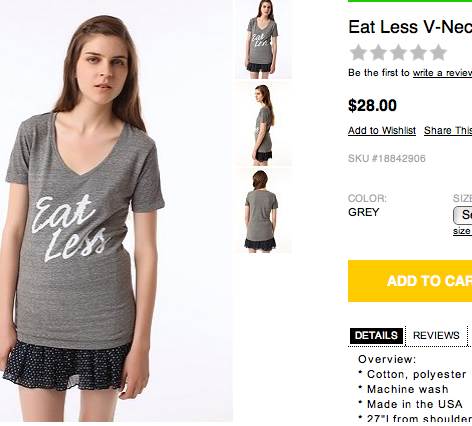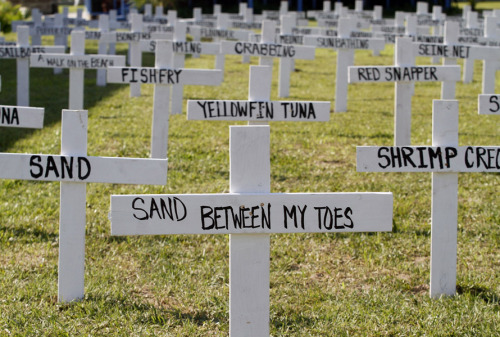
this past week, two t-shirts were brought to my attention. the first was this lovely "eat less" number, pictured above, was available for purchase in urban outfitters stores and online. the second was brought to my attention by my friend karina with the subject like wtf??. (un)surprisingly, it is also sold by urban outfitters, and featured an uncle sam type figure holding an unconcious (or dead?) half-naked woman draped in an american flag and demanding that fathers protect their daughter's virginity. unbelievable? believe it:

so here we have two offensive garments, both making comments and in some sense claiming ownership over women's bodies and sexualities (which are so intrisically connected - think about which women are permitted which kinds of sexualities - which bodies do we sexualize, etc): the "women's" t-shirt, clearly tied up in body politics and explicitly pro-ana, and the "men's" t-shirt proclaiming that it is a father's responsibility to "preserve" their daughter's virginity. on top of that, in the second t-shirt, the image of uncle sam as the father is rendered even more offensive and frightening, as though he represents the big bad government lording over young women's sexualities.

the "eat less" one conjurs up debates about who has the right to tell who to eat what and how much. there are so many other aspects of our society that judge us for our eating habits and/or size, why do we need a t-shirt to bark commands at us? aside from enraging me about the fact that this is specifically targetted towards young women, this t-shirt raises some of my serious complaints and concerns about how eating disorders and general harmful "body snark" (as i like to call it) constantly finds its way into (retail and high) fashion, as much as i try to pretend otherwise... as much as we are seeing an increase in "body acceptance" discussions in mainstream magazines and ad campaigns (think the dove "real beauty" campaign), at the end of the day the fashion industry still constantly tries to sell us insecurity and body hate. but that might be something to take up at another juncture.
these products raise some serious questions, mainly... why. why do these t-shirts exist? why are these t-shirts for sale, and who would buy them? are they simply jokes in bad taste that many don't think they should have to stomach? a lapse in judgement on the part of the designer, the company, and its staff? a simple oversight? we can debate the reasons why this specific company thought that selling these items was not only acceptable, but a wise business decision, but that is not why i am calling them to your attention. i am interested in what steps we take, as critical fashion lovers, when we see offensive items like the aforementioned. what questions do we ask, and what actions should we be taking?
in the case of these t-shirts, people took action. understandably, many people were pretty pissed off about these two t-shirts, and not soon after they were noticed, some young women decided to organize a "girlcott" of urban outfitters until the t-shirts was removed from stores. from their facebook page:
Let Urban Outfitters know you won't be buying from them until they pull the sexist clothing items from their store and issue a statement committed to creating and selling anti-sexist items:as of June 6th, urban outfitters claims the t-shirt has been pulled. well, not quite. you can't buy it online anymore, but if you go to their stores you can still have your dose of fucked up body image, since it is in such short supply elsewhere. sidenote: for those claiming not to understand why a t-shirt that says "eat less" could be construed as offensive or pro-ana, i suggest reading the comments on the posts linked at the end. i think it's quite clear why it's offensive. what i am really interested in understanding are the specific dynamics at work here in the capitalist/consumerist fashion industry.
Tweet this: TO @UrbanOutfitters - sexism may sell, but we're not buying. Throw out the sexist shirts, make clothes for all! http://ht.ly/1Tz02 #girlcott
Call 1.800.282.2200 and issue a customer service complaint. Tell the representative that you will not buy their clothing until they pull sexist items from the store and site and issue a statement committed to anti-sexist items in the future.
in this specific case, let us look at the t-shirt that demands girls "eat less." eating is talked about in these spheres as directly related to body size. the implicit message is that the person reading (and/or wearing?) should eat less, most likely because this t-shirt (without eyes or any sort of vision) has deemed the person reading the statement as being too large or as consuming too much food. how does this make any sense? it doesn't, really. but, a t-shirt like this one feeds into all kinds of other industries, namely the diet industry, which is closely connected to the beauty industry. so we have these three (capitalist) systems, fashion, beauty, and diet, working together to give young women around the world complexes about their bodies and the way they choose to adorn and modify them. ever since i have been interested in fashion, i have been concerned about the links between these systems, and i don't think they are more clearly explicit than in situations like these t-shirts.
but my main concern here is that getting rid of this t-shirt doesn't necessarily change the fact that these systems work together to oppress, humiliate, and objectify women in every level of production. taking the "eat less" t-shirts off store shelves is, yes, a victory of sorts, but it only makes me wonder more about the way the company that thought selling this was a good idea operates. who is behind the scenes? who is profitting? and most of all, is this t-shirt the only place in the levels of urban outfitters where women are subjected to body hate and discrimination?
frankly, i wasn't surprised to see that these t-shirts were being sold by urban outfitters, given their track record (it ain't a whole lot better than american apparel). in my opinion, jezebel commentor everyonesfree couldn't have put it better:
I don't expect Urban Outfitters to be a responsible company, given the racist and discriminatory products I've seen in the past, as well as it's documented stealing of trademarked ideas from indie crafters and designers, but this is truly a sorry excuse for 'fashion'. It is not edgy, it is not harmless, and I would hope that my email and the hopefully thousands more that you get will make the company see how offensive this shirt is.and this is where i think the problem is. the thing is, me not spending money at urban outfitters isn't really a change of habit for me. my girlcotting of this store won't change a thing about my issues with the way they run their business or what they sell, and my complaints with many other retail giants like them. my questions are more about the effectiveness of calling attention to specific examples of sexism like the aforementioned ones.
are these the things we, as young feminists, choose to be outraged about?
one specific t-shirt, or the problematic ideologies that the t-shirt represents?
are they part of larger struggles?
where does that struggle begin, and how will it end?
one specific t-shirt, or the problematic ideologies that the t-shirt represents?
are they part of larger struggles?
where does that struggle begin, and how will it end?
so let's say the offensive t-shirt in question is pulled from stores. does that mean the store is now less sexist and fatphobic? what about when the same store refuses to hire a woman, because they don't sell clothing in her size? or because she doesn't fit the "image" that urban outfitters wants to project to its customers? what sizes does that store cater to, and are there problems with that?
 what about who makes the clothing in question: are we as outraged when we read the label of the clothing and have no way of knowing what the work conditions were like, and if we did know, would our consumption habits change in any way? how many women were oppressed or exploited in physical and emotional ways, in labour, production, presentation, all of the work that went into selling this t-shirt?
what about who makes the clothing in question: are we as outraged when we read the label of the clothing and have no way of knowing what the work conditions were like, and if we did know, would our consumption habits change in any way? how many women were oppressed or exploited in physical and emotional ways, in labour, production, presentation, all of the work that went into selling this t-shirt? this is not meant to victimize the workers in question, but rather to address some concerns. i am simply asking questions about how and when we express our outrage, and what about. why is it pretty clearly universally offensive to point out a t-shirt that reads "eat this," and unsurprising to have it garner so much attention, while other situations that are explicitly oppressive and, pardon my french, fucked up, seem to receive little to no attention? in the same week, for example, i only heard one brief radio segment about the young men and women committing suicide while working in a factory making computers. were the working conditions in the factories that makes t-shirts for companies like urban outfitters any better, or worse?
this is not meant to victimize the workers in question, but rather to address some concerns. i am simply asking questions about how and when we express our outrage, and what about. why is it pretty clearly universally offensive to point out a t-shirt that reads "eat this," and unsurprising to have it garner so much attention, while other situations that are explicitly oppressive and, pardon my french, fucked up, seem to receive little to no attention? in the same week, for example, i only heard one brief radio segment about the young men and women committing suicide while working in a factory making computers. were the working conditions in the factories that makes t-shirts for companies like urban outfitters any better, or worse?in honesty, yeah, i do think there are other things to be outraged about, especially this week. i can't seem to escape it. first, the foxconn suicides (as a former factory worker i feel a certain amount of solidarity and sadness) and of course with the oil spill in the gulf destroying ecosystems, killing animals, and ending people's livelihoods... not to mention the israeli attacks of the free gaza flotilla in international waters.
but! if we are going to express our outrage as consumers in the fashion industry, my question remains: what steps should we take, as critical fashion lovers, when we see oppressive systems at work?. what questions do we ask, and what actions should we be taking?
it is great to see people being mobilized and it would be great if these t-shirts were no longer being sold. however, i am wondering what happens when we look at the reasons why this t-shirt existed and was being sold in the first place, and what we can do to actively challenge those reasons and hopefully change them.
i think we, as critical fashion lovers, need to think about and share more productive ways we can challenge oppressive systems when we see them at work, wherever we see them happening. if you have any suggestions, now is the time to share them.
links:
feministing: really, urban outfitters? (the comments are worth reading)
the tummy project: keep tummy shaking on
jezebel: urban outfitters pushes pro-ana movement
the frisky article: urban outfitters wants dads to protect sacred virginity
tips for an effective boycott
facebook girlcott group
if it was my home: visualizing the bp oil spill






